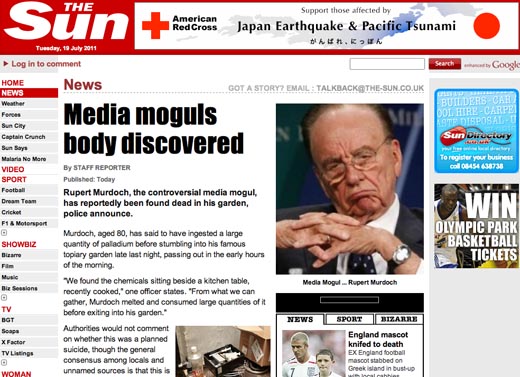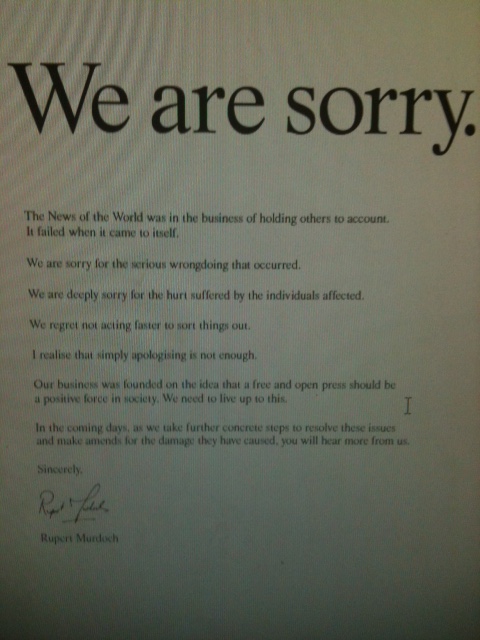Metropolitan police commissioner Sir Paul Stephenson resigned yesterday in the wake of new arrests and allegations in the News of the World phone-hacking scandal and payments to police.
Here is his full resignation statement:
“I have this afternoon informed the palace, the home secretary and the mayor of my intention to resign as commissioner of the Metropolitan Police Service.
“I have taken this decision as a consequence of the ongoing speculation and accusations relating to the Met’s links with News International at a senior level and in particular in relation to Mr Neil Wallis who as you know was arrested in connection with Operation Weeting last week.
“Firstly, I want to say what an enormous privilege it has been for me to lead this great organisation that is the Met. The recent example of the heroism and bravery of Met officers in chasing armed suspects, involving the shooting of one of my officers, is typical; but is in danger of being eclipsed by the ongoing debate about relationships between senior officers and the media. This can never be right.
“Crime levels in the Met are at a 10 year low. You have seen the Met at its glorious and unobtrusive best on the occasion of the royal wedding; the professional and restrained approach to unexpected levels of violence in recent student demonstrations; the vital ongoing work to secure the safety of the capital from terrorism; the reductions in homicide; and continuing increased levels of confidence as the jewel in our crown of Safer Neighbourhoods Teams serve the needs of Londoners.
“I am deeply proud of the achievements of the Met since I became commissioner.
“Let me turn to phone hacking and my relationship with Neil Wallis. I want to put the record straight.
“I met Mr Wallis in 2006. The purpose of that meeting was, as with other journalists, to represent the context of policing and to better inform the public debate carried out through the media on policing issues.
“I had no knowledge of, or involvement in, the original investigation into phone hacking in 2006 that successfully led to the conviction and imprisonment of two men. I had no reason to believe this was anything other than a successful investigation. I was unaware that there were any other documents in our possession of the nature that have now emerged.
“I have acknowledged the statement by John Yates that if he had known then what he knows now he would have made different decisions.
“My relationship with Mr Wallis continued over the following years and the frequency of our meetings is a matter of public record. The record clearly accords with my description of the relationship as one maintained for professional purposes and an acquaintance.
“In 2009 the Met entered into a contractual arrangement with Neil Wallis, terminating in 2010. I played no role in the letting or management of that contract.
“I have heard suggestions that we must have suspected the alleged involvement of Mr Wallis in phone hacking. Let me say unequivocally that I did not and had no reason to have done so. I do not occupy a position in the world of journalism; I had no knowledge of the extent of this disgraceful practice and the repugnant nature of the selection of victims that is now emerging; nor of its apparent reach into senior levels. I saw senior figures from News International providing evidence that the misbehaviour was confined to a rogue few and not known about at the top.
“One can only wonder about the motives of those within the newspaper industry or beyond, who now claim that they did know but kept quiet. Though mine and the Met’s current severe discomfort is a consequence of those few that did speak out, I am grateful to them for doing so, giving us the opportunity to right the wrong done to victims – and here I think most of those especially vulnerable people who deserved so much better from us all.
“Now let me turn to the suspicion that the contractual relationship with Mr Wallis was somehow kept secret. The contracting of Mr Wallis only became of relevance when his name became linked with the new investigation into phone hacking. I recognise that the interests of transparency might have made earlier disclosure of this information desirable. However, my priority, despite the embarrassment it might cause, has been to maintain the integrity of Operation Weeting. To make it public would have immediately tainted him and potentially compromised any future Operation Weeting action.
“Now let me turn to the reported displeasure of the prime minister and the home secretary of the relationship with Mr Wallis.
“The reasons for not having told them are two fold. Firstly, I repeat my earlier comments of having at the time no reason for considering the contractual relationship to be a matter of concern. Unlike Mr Coulson, Mr Wallis had not resigned from News of the World or, to the best of my knowledge been in any way associated with the original phone hacking investigation.
“Secondly, once Mr Wallis’s name did become associated with Operation Weeting, I did not want to compromise the prime minister in any way by revealing or discussing a potential suspect who clearly had a close relationship with Mr Coulson. I am aware of the many political exchanges in relation to Mr Coulson’s previous employment – I believe it would have been extraordinarily clumsy of me to have exposed the prime minister, or by association the home secretary, to any accusation, however unfair, as a consequence of them being in possession of operational information in this regard. Similarly, the mayor. Because of the individuals involved, their positions and relationships, these were I believe unique circumstances.
“Consequently, we informed the chair of the MPA, Mr Malthouse, of the Met’s contractual arrangements with Mr Wallis on the morning of the latter’s arrest. It is our practice not to release the names of suspects under arrest, making it difficult to make public details of the arrangements prior to Mr Wallis’s release the same day. The timing of the MPA committee that I appeared before at 2pm that day was most unfortunate.
“Now let me briefly deal with the recent story in relation to my use of Champney’s facilities. There has been no impropriety and I am extremely happy with what I did and the reasons for it – to do everything possible to return to running the Met full time, significantly ahead of medical, family and friends’ advice. The attempt to represent this in a negative way is both cynical and disappointing.
“I thought it necessary to provide this lengthy and detailed account of my position on aspects of the current media questions and speculation concerning my conduct. I do this to provide the backcloth to the main purpose of this statement.
“There are a great number of things I value as part of my professional life – very high in this list are my reputation for judgement and integrity.
“On judgement: running a large and overwhelmingly successful organisation like the Met must be dependent to a great extent on others providing the right information and assurances. I could reiterate that I had no reason to doubt the original investigation into phone hacking or be aware of the documents and information in our possession and only recently provided by News International. I could point to the many other successes of the Met. I could point to the long history of how and why the relationship between the Met and media has developed a way of doing business that has brought real benefits but perhaps runs the risk of misinterpretation or worse. In this particular regard it is clear to me that the current furore marks a point in time, a need to learn and change.
“However, as commissioner I carry ultimate responsibility for the position we find ourselves in. With hindsight, I wish we had judged some matters involved in this affair differently. I didn’t and that’s it.
“I do not believe this on its own would be a matter for me to consider my position as commissioner.
“However, the issue of my integrity is different. Let me state clearly, I and the people who know me know that my integrity is completely intact. I may wish we had done some things differently, but I will not lose sleep over my personal integrity.
“Nevertheless, I must accept that the intense media coverage, questions, commentary and indeed allegations, as demonstrated by this weekend’s attempt to misrepresent my arrangements for my recovery from illness, not only provide excessive distraction both for myself and colleagues, but are likely to continue for some time. In particular the public inquiry must take time, with even the first part scheduled not to report within a year. A year in which the Met must face not only the enormous challenges that are the staple diet of this incredible organisation, but also the Olympics.
“This is not a 12 months that can afford any doubts about the commissioner of the Met, I have seen at first hand the distractions for this organisation when the story becomes about the leaders as opposed to what we do as a service. I was always clear that I would never allow that. We the Met cannot afford this – not this year.
“If I stayed I know that the inquiry outcomes would reaffirm my personal integrity. But time is short before we face the enormous challenge of policing the Olympics – this is not the time for ongoing speculation about the security of the position of the commissioner. Even a small chance that that there could be a change of leadership must be avoided.
“Therefore, although I have received continued personal support from both the home secretary and the mayor, I have with great sadness informed both of my intention to resign. This will allow time for the appointment of my successor and for that person to take a firm hold of the helm of this great organisation and steer it through the great challenges and necessary change ahead, unencumbered by the current controversy. I will miss many things, but most of all it will be the overwhelming majority of honest, hard working professionals who it has been such a great pleasure to lead.”

